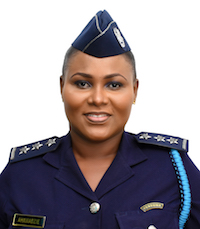 Perfect Ahamadzie
Perfect Ahamadzie
Revenue Officer
Customs Technical Services Bureau
Ghana Revenue Authority
Public Finance Program (’16)
Please tell us about your career path so far. What is your area of specialization and how did you come to work in this area?
After my Secondary School, I was enlisted into the Ghana Customs as a General Operation staff in 2008. I underwent one-and-a-half-year training in Para-Military and Customs Procedures. During the training, I was the ammunition training prefect. I was the overall “Best Female Cadet” and also obtained a certificate in Para-Military and Customs Procedures. Having graduated from the Customs Academy in 2009, I got posted to Sunyani in the Brong Ahafo Region of the Republic of Ghana where I performed several preventive duties including but not limited to patrolling the borders of Ghana to prevent smuggling, searching of vehicles and persons, scrutinizing customs documents to ensure customs duty is paid, examination of goods to ensure prohibited and restricted goods are not imported into the country, detection of uncustomed goods, ensuring public safety etc.
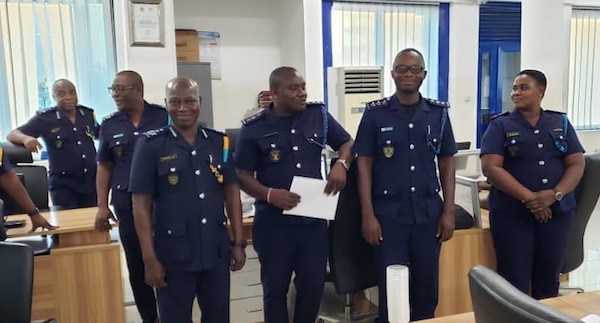
Gathering in the office after Perfect’s recent promotion to Revenue Officer
Furthermore, in 2015, I was transferred to the Customs Technical and Services Bureau Centre where I was a valuation officer for the period October 2016 to August 2018. My principal duty was the calculation of customs duty on the price actually paid or payable or apply other methods of valuation to arrive at the cost of an item after adding other charges such as commissions, an assist, royalties, inland transport charges, insurance etc to arrive at Cost Insurance and Freight (CIF).
Currently, I am working with the classification unit of the Customs Technical and Services Bureau where I apply Harmonized Commodoty Description and Coding System (HS) code and customs rate on goods for duty purposes. I rose through the rank from a Junior Revenue Assistant III (JRA III) to the rank of a Revenue Officer, after passing a one-hour interview in July 2019. I am the only female officer among my year-group who has been promoted to the rank of a Revenue Officer in the year 2019 till date.
You are currently serving as Revenue Officer in the Customs Technical Services Bureau of the Ghana Revenue Authority. What are your main roles and responsibilities?
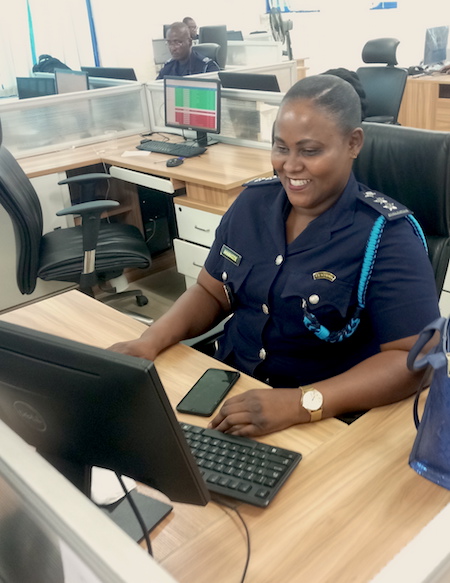
A customs officer performing her duties at work ….
As a classification officer, I diligently apply the General Interpretation Rules of classification to arrive at a specific Harmonized Commodity Description and Coding System (HS) code for a product. This requires the identification of the product as per description, composition, use, measures such as length, weight, volume and how the product is packaged. I rely on the chapter and section notes with the aid of explanatory notes, World Customs Organization (WCO) rulings etc. to arrive at the appropriate code.
As for responsibilities, I’m charged with having a cursory check of all documents submitted, such as invoice, bill of lading, country of origin certificate, packing list, and any other necessary documents. Also, I am responsible for meeting the target set for the year, establishing and managing classification policy to ensure the uniform classification of all goods that are imported into the country, coordinating all classification decisions within the administration, reducing customs clearance delays, minimizing classification disputes, reducing unnecessary costs in doing business. And finally, perhaps the most important aspect is overall trade facilitation.
In your current capacity, what do you see as the main opportunities and challenges for Ghana over the course of the next five to ten years?
When it comes to opportunities, a proper implementation of all the above measures provides the basis for accurate imposition of duty rates and assessment of taxes. According to the Index of Economic Freedom 2019, Ghana’s economic freedom score is 57.5 making its economy the 109th freest. Its overall score has increased by 1.5 points, with a gain in fiscal health and higher scores for labor and monetary freedom more than offsetting declines in the tax burden and business freedom score. Ghana is ranked 13th among 47 countries in the Sub-Sahara African Regions, and its overall score is above the regional average, although still below the world average.
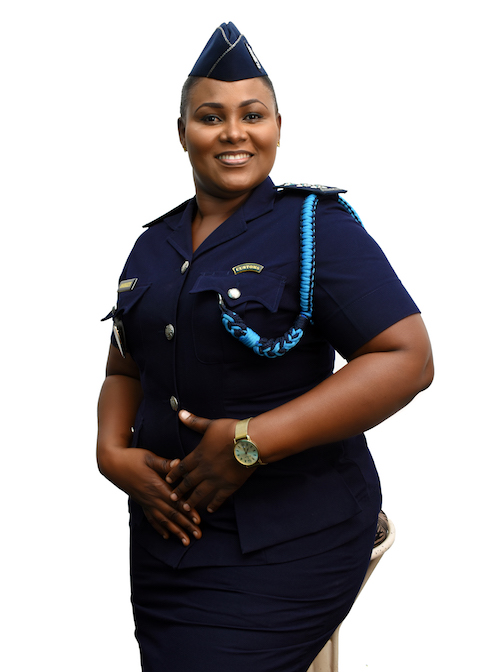
Perfect Ahamadzie, a proud customs officer
Ghana has also prioritized industrialization to create jobs and spur economic growth in the coming years. The rule of law in Ghana today and in years to come is expected to increase. Currently, property rights are recognized and enforced; reforms have yielded a reduction in the number of bureaucratic procedures and paperless administration across all government institutions is expected to increase and be fully automated. All this will likely improve the climate for investors and entrepreneurs and thus the overall competitivenesss of the country.
Yet, many challenges remain. Maintaining a fiscal consolidation stance and staying on a sustainable path through the 2020 general election cycle will be a challenge over the next two years and beyond. Also, the Ghanaian energy sector is in dire financial conditions and without immediate remedy. This situation poses serious fiscal risks in the coming years. The sector is facing high costs from excess power capacity and natural gas supply, which are exacerbating the existing revenue gap. An Energy Sector Recovery Program (ESRP), approved in May 2019, provides an action plan to the Government to bring the sector back into financial balance over the next five years.
Another serious challenge that Ghana will face in the next five to ten years is illegal mining, popularly known as “Galamsey”. Illegal mining operation is contaminating and destroying the farmlands, forest and water bodies in Ghana. Illegal gold mining especially further exacerbates a volatile cocoa market. In 2014, experts predicted a global cocoa shortage by 2020. However, cocoa production statistics have been unpredictable since then according to the most recent data from 2015 to 2016 growing season. Recently, the price of cocoa beans has plummeted to a historic low on the global commodity exchanges, negatively impacting the profits of the West African cocoa farmers. The government of Ghana is struggling to balance the economic boom of small scale mining with environmental and safety protections.
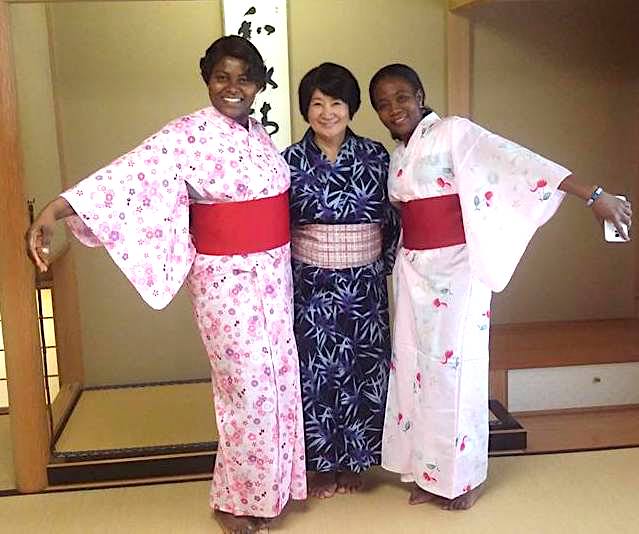
Enjoyng wearing a yukata with Yagi-sensei, the Japanese teacher
The most challenging thing when it comes to the valuation of goods is the introduction of the World Trade Organization Agreements (WTO) rule on valuation of imported goods. Countries that are signatories to the WTO are required to adhere to this valuation agreement but adhering to the terms with its provisions of the agreements has often proved problematic, since they include the introduction of modern principles of tax and customs administration such as self-assessment.
Another challenging factor is the organizational structure in Ghana Customs. Developing an organizational structure to support effective classification and valuation control requires a balance between the need to provide the information and services at the local level and the need for trained specialists who can interpret the law and detect problem areas.
It is also challenging to work under environments of political colonization and conflict of interest since most of the traders in Ghana deploy political powers thereby influencing the integrity of the work. There is also an issue of frequent system changes that affect the professional status of officers, e.g. replacing well-trained professionals with the less competent ones due to favoritism and nepotism.
What are some of the biggest challenges you face in your work? And what have been the most interesting or rewarding aspects of your career thus far?
The biggest challenges I face in my work are a lack of accurate description of goods, inaccurate disclosure of the composition of goods, and lack of adequate laboratory facilities needed to put the product to the test by importers and other interested parties. Also, the frequent introduction of new products, especially electronics, in terms of composite goods poses new challenges.
I feel fulfilled because of my exposure and knowledge of different kinds of goods that enter the international market. It also enhances my capacity in international trade processes or procedures, and above all, it is rewarding that my role leads to the maximization of revenue and development of my country.
What led you to GRIPS? What was the most important thing you learned while here and how has your experience at GRIPS prepared you for future endeavours?
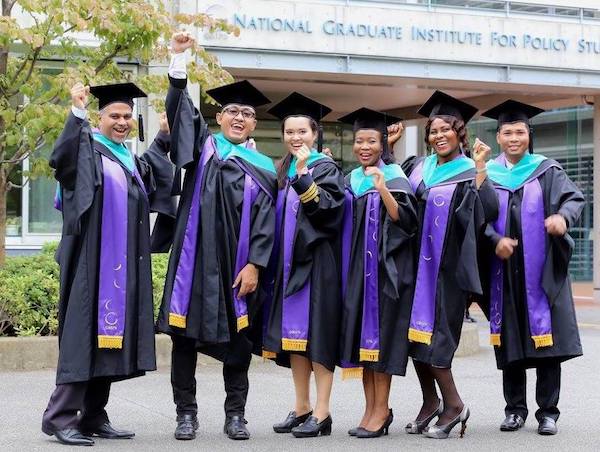
Happy faces at GRIPS graduation day. Perfect wih her with classmates from the Public Finance Program
Pursuing my master’s degree and having a well-grounded foundation in customs procedures that would give me a leading edge in my career was what led me to GRIPS. I am very honored and grateful that I have been able to apply what I learned at GRIPS with regards to customs procedures. The lessons I learned through the program have given me a leading-edge over my colleagues in the course of executing my duties. I am able to execute my work confidently, competently, and professionally. My experience at GRIPS has taught me time management, leadership and managerial skills that will help me in my future endeavors.
Have you had any involvement, professional or otherwise, with Japan since your graduation?
I was nominated to present my policy paper at the 5th GRIPS Students Conference on September 1st 2016. I again had the opportunity to present my paper at the Customs and Tariff Bureau in the Ministry of Finance-Japan. After which I was given a certificate. Since my graduation, I have not yet had any involvement with Japan but I am hoping to pursue my Ph.D. there in the future.
How do you maintain a balance between your work and the rest of your life? And what is your favorite thing to do when you are not working?
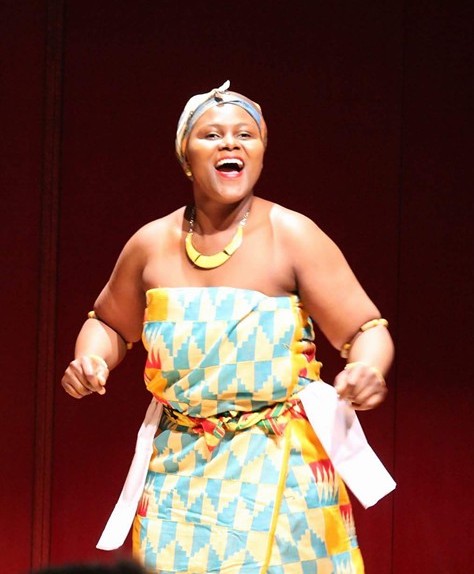
Perfect performing a Ghanaian dance at the GRIPS Culture Day
It’s a challenge to balance my three children with my excellent career. So I try to do the following to ensure a successful balance:
I manage my mind to ensure doubts and anxiety doesn’t creep in. Take some vacation to visit my family, friends, and loved ones. Set boundaries for myself and my colleagues, to avoid overworking and burnout. Above all, I set achievable goals that I am passionate about, concerning my career, health and relationships. I think about what tasks are most important for achieving a healthy work-life balance and prioritize them.
The favorite things I do when I am not working are reading books that pertain to my career such as books on Harmonized System (HS) classification, valuation books, trade facilitation books, WCO books etc, and praying to God for protection and guidance in life. I also engage in other businesses that will bring me income for future contingencies without depending on others for help. I also like cooking, traveling and reading information about GRIPS.
What are some of your fondest memories of your time spent at GRIPS? And what do you miss about Japan?
My most vivid memory is when an earthquake occurred when I was on the 14th floor and I could not go down. So I started praying and hide under the study table. I lost my pass and I had to travel a long distance to secure it. Another unforgettable experience was that one day I woke up and saw snow at my doorstep. I started praising God because it was my first time seeing snow.
I miss the WCO scholars and students I met during my time studying in GRIPS. I miss speaking the Japanese language anytime I go to the market, I miss wearing a kimono, Japan’s safety and security, its culture and transportation system. Above all, I miss my supervisor, Professor Dainn Wie so much. Through her guidance, my policy paper was selected as the best of the year for the Customs Program.
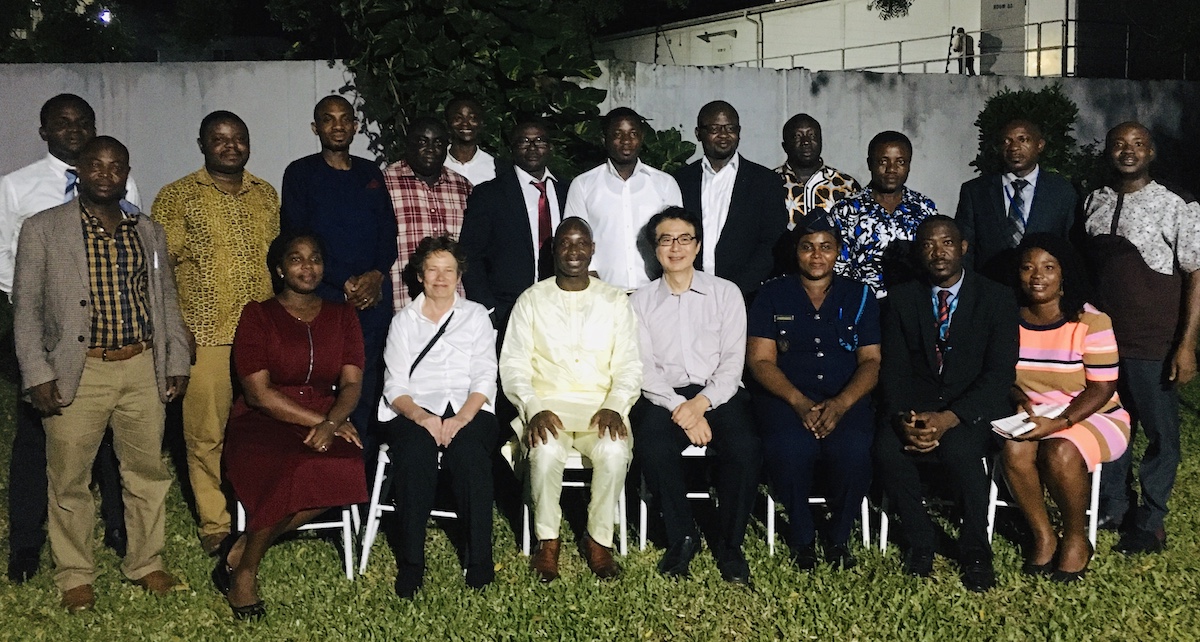
A recent alumni gathering in Accra when GRIPS Vice-President Prof. Sonobe and Karin Hillen visited Ghana, December 2019
My advice to anyone considering studying at GRIPS is to be focused and determined. Learn and be prayerful because that’s the key. Furthermore, I advice them to maintain a good lecturer and student relationship. They must also consider managing their time well to meet the required points for graduation. I would also like to tell anyone to be careful and considerate of the cultural differences. For example, when speaking loud while on a train, people around you would feel annoyed.
How would you like to maintain involved with the School? What do you expect from GRIPS as an alumnus and do you have any suggestions on how to further utilize the GRIPS alumni network?
As an alumnus, I will introduce GRIPS to my colleagues and friends who want to acquire a solid knowledge and leadership skills in their field of work.




